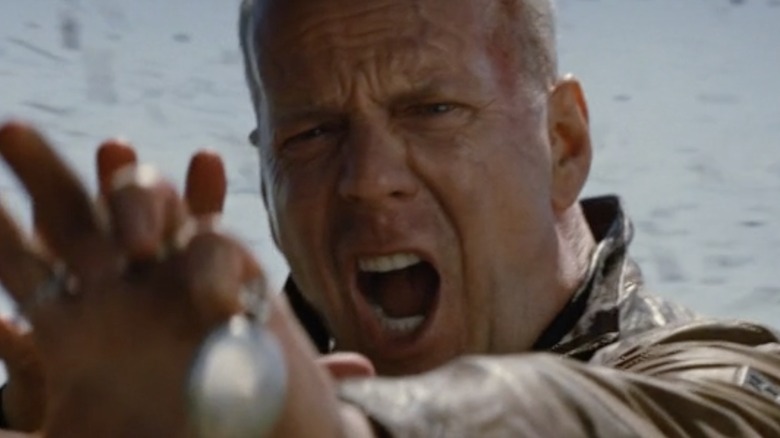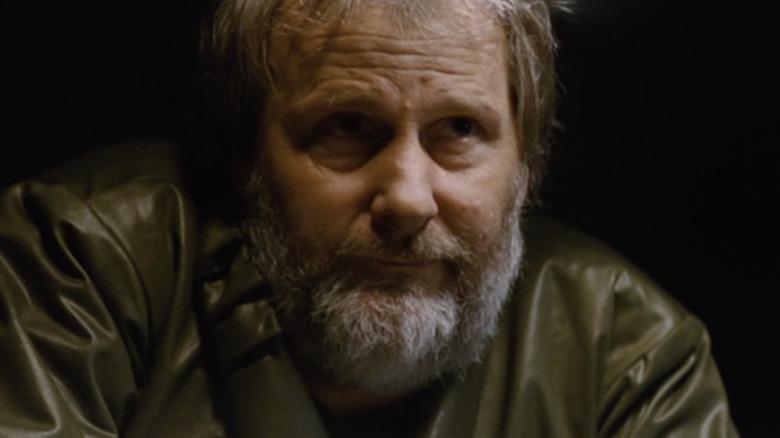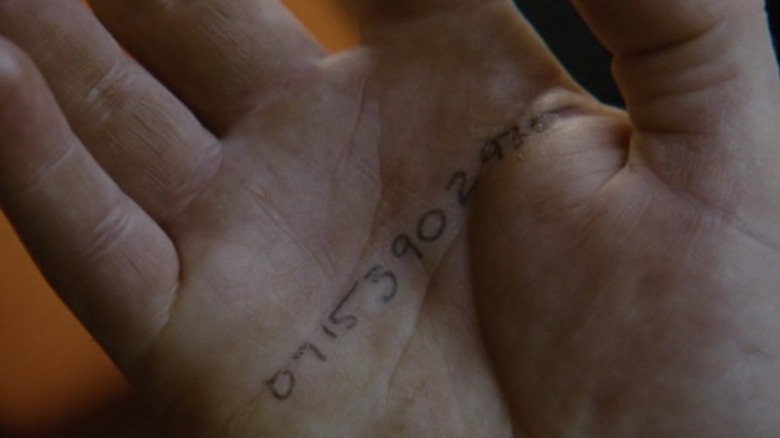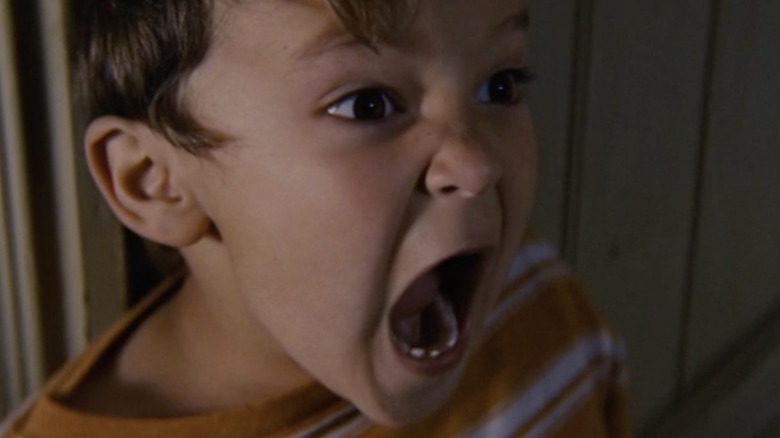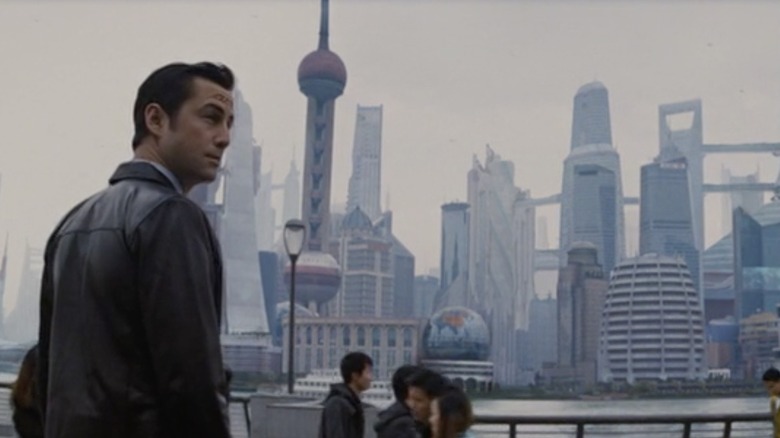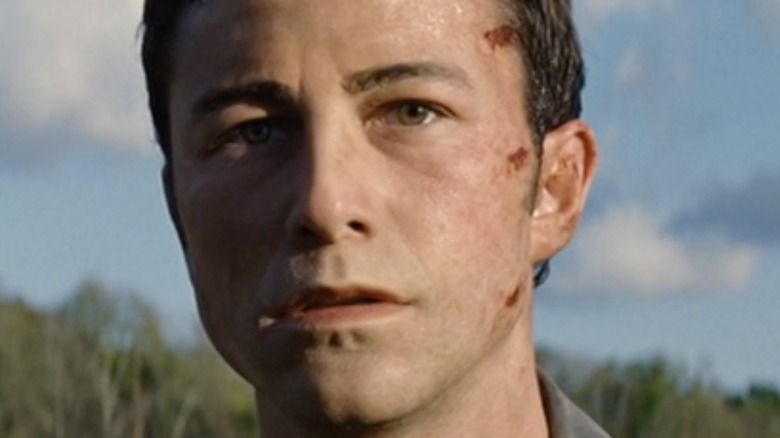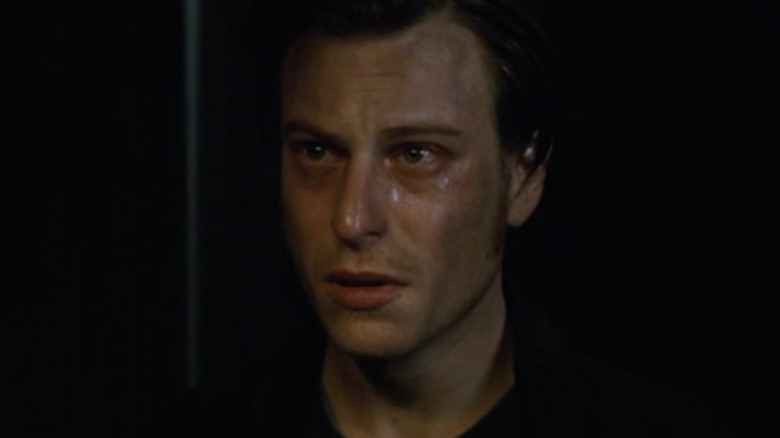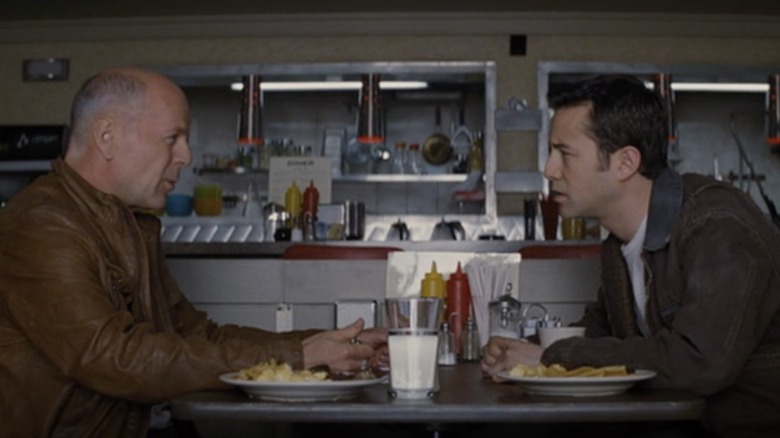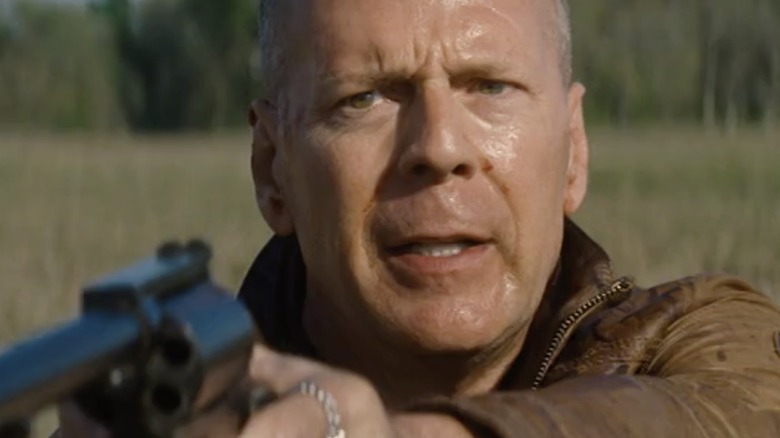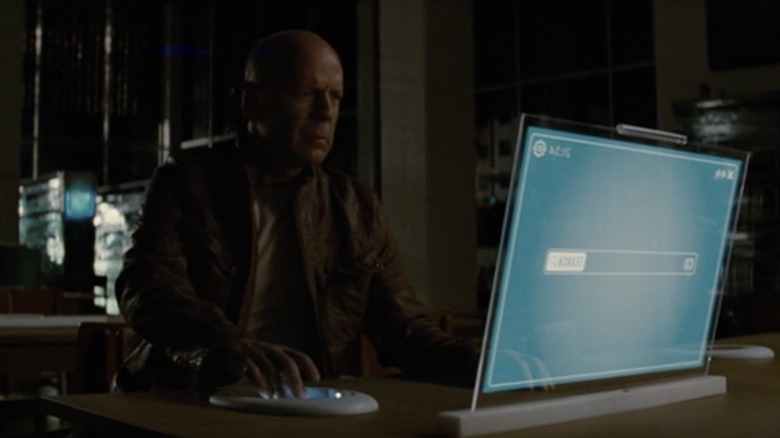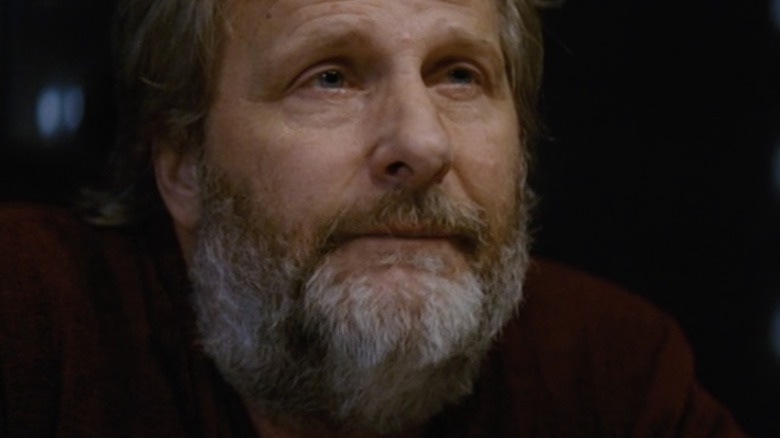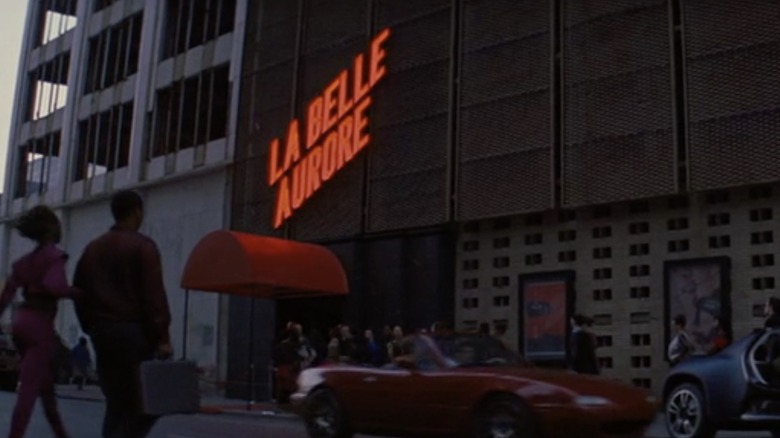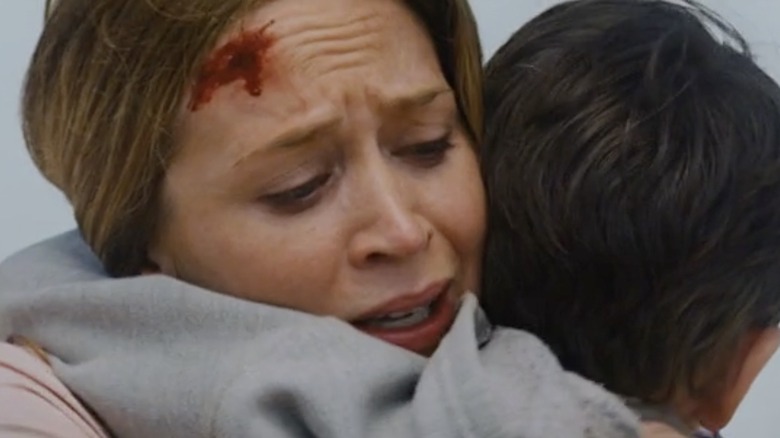Things You Only Notice The Second Time You Watch Looper
What do Bruce Willis and Joseph Gordon-Levitt have in common? They've both played the same guy. And that guy is a man named Joe. In the year 2074, time travel has been invented, but it is outlawed. It's still used by criminal organizations though, so when future mobsters need to eliminate someone, they transport them back 30 years to be killed by hitmen like Joe (known as "loopers"). The body consequently disappears from the future and the body in the past technically doesn't even exist yet — it's clean, simple, and very lucrative. Loopers are paid in bars of silver, with a beefy payday being made in gold upon contract termination. When a looper's contract is terminated, their payment comes with the caveat that they must eliminate the future version of themselves — thus, closing their own time loop.
The younger version of Joe is played by Joseph Gordon-Levitt, whose world falls apart when his future self is sent back to be killed by his younger self, but manages to escape. The future version of Joe is played by Bruce Willis. The action star is in good form as an aging assassin trying to reunite with his wife. "Looper" implements complex time travel elements, but doesn't get bogged down by the finer details. Instead, the film uses time travel as a story device to help it focus on character development. With so many overlapping storylines, future and past versions of characters, and other intricacies of time travel, it can be easy to miss details the first viewing. Giving "Looper" a second watch will reveal many things you didn't notice the first time.
Spoilers are abundant from here on out!
Looper is set in a town run by criminals
The world-building in "Looper" is done with nuance. Tidbits of dialogue and fleeting images are used to help create a bigger image of the world Joe resides in. We can gather from small pieces of information that the mobsters in Kansas City 2044 operate with little to no interference from local law enforcement. This is hinted at right from the beginning of "Looper." The first few minutes of the film show Joe zipping through town, narrowly missing pedestrians, as they leap out of the way to avoid the hitman's sidewalk shortcuts and hot rod antics. There is even a passing moment when a man attempts to steal supplies from a fellow citizen and is nonchalantly gunned down. Joe continues on his drive, paying little mind to the incident.
The most telling aspect of the town's criminal lordship is in the demeanor of the mobsters around town. When Jesse (Garrett Dillahunt) approaches Sara's (Emily Blunt) farmstead, it is done under the pretense of being a police detective gathering information on a fugitive. No badges are flashed to confirm his authority and it is heavily inferred that he can make life difficult for Sara should she not comply. The mob is able to approach civilian households with the authority of government officials, as well as amass waves of helicopters for searches, as is seen by the relentless city-wide manhunt for Future Joe. No information is offered on whether these helicopters were owned by the mob or if police corruption is out of control. Either way, it's clear who is in charge in 2044.
Future ink stays on your hand through thick and thin
For many, the promise of flying cars and whimsical weaponry are at the top of the list of exciting potential future inventions. One type of future technology that perhaps doesn't occupy most people's dreamscape though is that of office supplies. With paper growing more obsolete by the year, it would stand to reason that companies might attempt advancements on analog devices. Pen and ink have been staples of humanity for centuries, but it seems like it has never had the tenacity of ink from the year 2074.
At least that is the assumption to be made based on what we see in "Looper." We noticed during our second viewing that future ink is as tough as they come. Future Joe (Willis) seeks to correct his own future by using information given to him over the phone in the year 2074. The information is a sequence of numbers that could help him track down The Rainmaker. He grabs a pen and writes the numbers on the palm of his hand. This scene shows Future Joe in a different outfit than the one he is wearing when he is first taken. This means he writes the information on his hand, goes about his day, changes outfits, gets abducted by the future mobsters, fights them off in the warehouse, travels to the past, fights off his past self, and travels into the heart of Kansas City, all while the ink on his hand stays intact. That is a level of ink-based resilience you can only find in tattoo parlors nowadays.
We never actually see The Rainmaker
All the events in "Looper" are kicked off by the existence of one man: The Rainmaker. His character is pieced together with dialogue from characters in the year 2044. The Rainmaker of 2074 decides that the looper program is no longer required and sets out to terminate all contracts. In rapid-fire succession, loopers are being sent the future versions of themselves for eradication. The characters in the past aren't granted the luxury of posterity, so they continue about with their drug-riddled lives, blissfully ignorant and content with their golden paydays. This sequence of events is what leads to Future Joe's abduction and the murder of his wife.
Despite The Rainmaker's pivotal role in the plot, we never actually see his "reign of terror" in 2074. We never even get a glimpse of what he may look like. All we know is that he overthrows the five major bosses in the criminal syndicate all by himself. After meeting Cid (Pierce Gagnon), and witnessing his rage, we can piece together the puzzle of how The Rainmaker was actually able to make this happen.
We get a glimpse of The Rainmaker's power in child form, but it isn't until the second time we watch "Looper" that we realize there are never any scenes showing what Cid would later become. It's actually a smart decision to not give us any vivid details about a sociopath in 2074 exploding people in his pursuit of vengeance and power. Ultimately, this omission helps maintain the semblance of hope that Young Joe feels when he decides to make the ultimate sacrifice.
Everyone in the future (2074) is tagged
By this point, we can wrap our brains around the basic story of loopers and their purpose. What may be itching your cortex though, is what is the point of all this? In the world of "Looper," villainous organizations have been hiding bodies for quite some time, and we don't see a specific (aside from the obvious ethical and moral) reason as to why these methods need to change. In the first viewing of "Looper," Joe's narration floods the viewer with information. Amidst all these details, we missed a crucial piece of the puzzle: At one point, Joe (Joseph Gordon-Levitt) informs us that a type of human tagging system makes discreet disposal of a body in 2074 nearly impossible. He explains this simply by saying, "It's nearly impossible to kill someone in the future. So I'm told, with tagging techniques and what not."
Director Rian Johnson went into further detail in an interview with /Film: "Everybody in the movie has this nanotechnology tracking in their body and whenever there's a death, a location tag is sent to the authorities from this tracking material. So they can't kill people in the future. But if they send them back, that is not triggered." While this level of detail wasn't in the film, this outside information does help establish a clearer image of what the year 2074 is like and why criminal organizations would go to such lengths to cover their tracks.
Joe's final line is the same said earlier by Abe
Whether we log this under foreshadowing or a poetic loop is perhaps for film professors to decide. What we can say is we didn't catch this display of screenwriting prowess the first time we viewed "Looper." First off, it's necessary for us to understand just how dangerous it is to "let your loop run," which is when a looper lets their future self go instead of killing them. We see the deadly repercussions of this faux pas when Joe's friend Seth (Paul Dano) allows his own loop to run and hides out at Joe's apartment.
Joe promises to keep him safe, until he has a conversation with their boss Abe (Jeff Daniels), who convinces him into giving up Seth. During their talk, Abe reminisces about his first impression of Joe, whom he hired as his youngest looper after he caught Joe running one of his watch shops. Abe states, "I could see. Like seeing it happen on the TV. The bad version of your life. Like a vision. I could see how you'd turn bad. So, I changed it."
We didn't make the connection the first time we watched "Looper", but in our second viewing, we immediately recognized a clever callback to this conversation with Abe. In the final scene, Joe watches Sara stand between Old Joe and her son, Cid, and there is a moment of clarity for Young Joe, which echoes his mentor's sentiment. He observes Cid's possible future and states through narration, "... laid out in front of him, the bad path. I saw it. And the path was a circle. Round and round. So, I changed it." The looper then taps into his newfound altruism and turns his blunderbuss on himself, sacrificing his own life in the hopes that Cid may have a better one.
If you or anyone you know is having suicidal thoughts, please call the National Suicide Prevention Lifeline at 1-800-273-TALK (8255).
Kid Blue never gets any redemption
One of the antagonists that we can't help but feel sorry for is Noah Segan's character, Kid Blue. The childish mobster is desperate for approval from Abe, but can't seem to do anything right. His mistakes continually mount up throughout "Looper". We don't see the incident, but little jabs from both Young Joe and Abe inform us that Kid Blue had a prior incident where he shot himself in the foot. The impressionable, young mobster is then charged with making off with the silver from Young Joe's safe. As we know, this leads to him being locked inside that safe and both versions of Joe escaping custody.
Kid Blue's mistakes don't end there. His plan to ambush both Joes at the diner results in them both escaping, yet again. Then once he actually captures Old Joe, he brings him back to La Belle Aurore ... where he allows him to escape again! Only this time, Old Joe guns down the entire looper organization. You can't mess up much more than that. It wasn't until our second viewing of "Looper" that we realized poor Kid Blue never gets a chance to redeem himself.
After his final mistake, he is gunned down by Young Joe out by the farm. The relationship between Abe and Kid Blue raises many questions as well, like why their relationship feels like that of a father and son. One of our favorite theories is that Kid Blue is actually a younger version of Abe, which would explain why Abe gives the perpetual screw-up so many chances (via Comingsoon.net). It's something to think about the next time you watch "Looper."
The chicken or the egg paradox
Time travel is a tricky business. Filtering it through the prism of action-packed entertainment can bring rise to several questions that may leave audiences scratching their melons. Thankfully, "Looper” doesn't leave too many inconsistencies lingering after the final credits roll. Everything in the story feels tied up in a neat little ribbon. Young Joe eliminates himself, thus eliminating Old Joe and all impending doom. From the creation of The Rainmaker to the death of Joe's wife, all the tragedy wrapped up in his loop would be yanked from existence. The real brain melter reveals itself once you give "Looper" a second viewing.
In those final moments in the sugar cane fields, Young Joe sees a vision of how The Rainmaker is created. In this vision, Old Joe kills Sara to get a clear shot at Cid, but then Cid escapes and winds up as a lost kid on his own with unfathomable power plus a lust for vengeance against the looper community. This pursuit of vengeance is what leads to the death of Old Joe's wife and his need to travel into the past, where he eventually kills Cid's mom, Sara ... but Sara's death is why Cid becomes The Rainmaker, and also it occurs because Old Joe was forced to go into the past because of the existence of The Rainmaker. This entire sequence of events is a loop, with no discernible beginning or end. If you are able to make sense of this little paradox, let us know, and we will meet up for waffles in the fifth dimension.
Old Joe didn't change and he's still selfish
There are few heroes in the "Looper" story and Bruce Willis is definitely not one of them. Willis' character of Old Joe is different from his young counterpart, but also alarmingly similar. His motive lies in the love he has for his wife, which makes assigning him the label of villain feel somewhat uncalled for. Old Joe has lived a rough life that's been wrought with poor choices, and meeting his wife is what supposedly changes him for the better. The marriage offers him true happiness and forces him to change his ways for the better. Her death at the hands of the future mobsters is what drives Joe to travel to the past and eliminate The Rainmaker.
While Old Joe's motives may be driven by love, he is still the same selfish person as Young Joe. Rather than take steps that could spare his wife's life, he instead chooses to attempt changing the future so he can still be with her. And he'll do it, no matter what it takes ... even if that means killing innocent children. Old Joe refuses to think about anyone other than himself and this toxic trait is what creates all the turmoil in 2044. He may point a finger at how "self-absorbed and stupid" his younger self is, but in reality he hasn't changed at all. Every step he takes in "Looper" is to get his own life back.
Future tech is displayed very sparingly
A blunderbuss is an odd choice for the loopers to carry. Points for style, but this is the year 2044 and we would think some new-age weaponry would be in use. Watching it again, we noticed that "Looper" actually uses future technology sparingly. Even when we do see some tech in use, it's displayed so quickly and nonchalantly that we hardly took notice — such as that flying fertilizer machine that Sara sends off to spray her sugar cane fields.
The most high-tech toy we see is the hoverbike. At first it is left to the curb by Joe's friend, Seth, because it won't start (our guess is this type of technology is still a bit janky). But it appears in several other scenes, albeit briefly. Another hint at what technology is like in 2044 occurs when Old Joe is doing research on The Rainmaker. He is in an empty office building searching through computers. The screens and the nifty buttonless keyboard appear beyond our time. Aside from some fancy screens and that hoverbike though, there isn't much that screams 2044.
Rian Johnson wants viewers to just enjoy the movie
Time travel in cinema has grown increasingly complex with each new addition to the genre. It used to be so much simpler. A time traveler would jump back to the year 1955, change a few things, and then travel "back to the future" in 1985 to observe its results. It's likely your family will have made some different furniture shopping decisions, but you'll still be in the same house with the same friends. This simplicity isn't present in time traveling films of the 21st century. Now we have time inversion, time dilation, time loops, and multiverses spanning infinite timelines. These are all complex mechanisms that Johnson wasn't interested in getting bogged down with. The primary objective of "Looper" is to entertain.
It is a bit meta, but character dialogue in "Looper" is used to remind us as moviegoers it's pointless to focus too much on the minutiae of time travel. For example, when Young Joe starts trying to comprehend how it all works, Old Joe states simply, "this is a precise description of a fuzzy mechanism. It's messy." It's clever for the writers to make it clear that the characters are confused about how it all works, so we can just let ourselves be confused along with them. Abe also sums up the thought processes around time travel in this world by saying, that time travel "just fries your brain like an egg." After dissecting it all with diagrams made out of straws, we'd have to agree with him. Our brains are properly scrambled.
There's a nod to Casablanca
Like the rest of us, criminals are also social creatures, who need a place to congregate, whether to brag to each other about their mounting felony counts or just cuddle up with their favorite stripper. Joe and his cohorts are no different. The short-sighted hitmen all choose to gather at a skin parlor known as "La Belle Aurore." The name of the club isn't referenced much in dialogue, but the camera lingers on the outside of the club a few times. Its glowing red neon sign beckons its consumers, but "La Belle Aurore" isn't just a fancy name. It is a reference to another cinema classic.
In "Casablanca," La Belle Aurore is the name of the cafe where Rick and Ilsa's romance blossomed. In fact, it's where the two jilted lovers last saw each other, before the Germans marched into Paris. The La Belle Aurore in "Looper" doesn't quite share the same romantic atmosphere as its name suggests — what with all its nudity and mob affiliations — but we do wonder about this reference to "Casablanca." Whether it's to foreshadow impending doom for Joe through a deep cut in cinematic history, or just because director Rian Johnson is a Humphrey Bogart fan and thought the name sounded sexy, we can't be sure. However, with all the small details in "Looper" that piece together a bigger picture, we're inclined to think it's the former.
Cid doesn't call Sara mom until the end
The storyline surrounding Cid's relationship with his mother Sara is at the heart of "Looper" itself. When we first meet the two, there is obviously a loving connection between them. But Cid continually refers to Sara by her first name, rather than "mom". Our first assumption is that maybe she wouldn't let him have candy for dinner, so he's just being a feisty child. After all, many of us know from our own childhoods that this is a surefire way to let mom know you were upset. As we learn later though, Cid was abandoned by Sara at her sister's farm. Her sister raised Cid as her own, and he knew her as his mother.
The importance of a loving relationship for Cid is paramount, given his unpredictable abilities. A lack of a maternal presence is what eventually leads to him becoming The Rainmaker. In the final moments of "Looper," Cid is shot in the cheek, which causes him to lose control and unleash all his power on Sara, both Joes, and an entire sugarcane field. However, Sara is able to comfort Cid and help him regain control, so these targets of Cid's rage don't get reduced to poofs of red mist. Cid relaxes, returns to his young, adorable self and, wiping tears from his eyes, whimpers, "Mom". This is the first time he refers to her as his mother and it is an important moment. This shows that the relationship between the two has grown and that Cid eventually using his powers for good is a real possibility.
